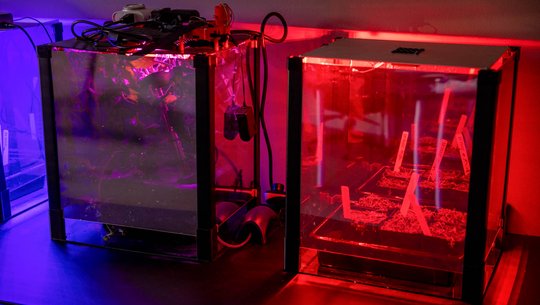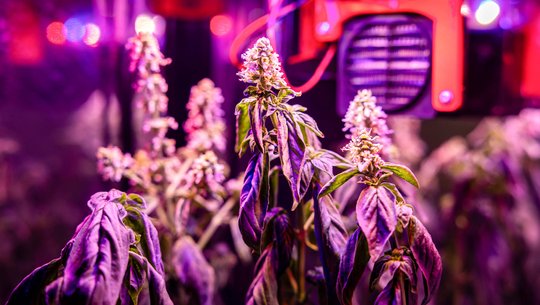
Tucked inside an Overland office park, MARSfarm is changing the way people across the world learn about agriculture. By bringing countertop-sized greenhouses to classrooms, the agtech company is helping students from elementary schools to research universities better understand plant science and greenhouse management.
The idea for the company, which launched three years ago, began seven years ago when Peter Webb, co-founder and CEO, and Drew Thomas, co-founder and chief operating officer, met with a group of fellow St. Louisans to brainstorm about open-source hardware and software for plant-growth chambers. That led to the creation of a $300 “food computer” that, Webb says, he initially expected to be purchased by hobbyists and citizen scientists. “We didn’t expect a demand from the education market,” he says.
Yet today MARSfarm technology is in classrooms from St. Louis to South Africa, spanning nearly 600 schools across 12 countries. Customers range from STEM-oriented research institutions studying the confluence of plant and data science to rural high schools preparing their students to run the farms of the future.
“For many schools, maintaining an existing or buying a new greenhouse is a couple hundred-thousand-dollar capital expense,” Webb says. “So more schools are opting to not have a greenhouse (on campus) but still have these agricultural programs.”
Compared to a traditional greenhouse, MARSfarm units are both cost-effective and compact — measuring in at 1.5 feet tall, 1 foot wide, and 1 foot deep. Each unit includes a small single-board computer so students can configure individual settings for their greenhouses.
Version 1 of the technology costs around $1,600, and some schools receive the product for free through nonprofits or loaner programs. Even more unique is the fact that MARSfarm tracks the conditions inside each miniature greenhouse and provides data on factors like temperature, light and CO2 levels, allowing students to closely monitor growing conditions.

By tying this type of data science to tangible outcomes, MARSfarm enhances the teaching and learning opportunities afforded to each classroom. Beyond agricultural science, the technology is being used in biology, chemistry and even math classrooms. Teachers can access an online community forum to gather and share ideas about how they are using the technology. Applicable uses range from teaching students how to keep agricultural logbooks to preparing for the math portion of the ACT and SAT by learning to read charts and graphs.
It also serves as a way to attract students to agriculture who may not have otherwise considered it as a future career. “There’s a real opportunity to get these students who are developing these exceptional STEM skills to see agriculture as a career and as a real way to make an impact,” Webb says.
The company also provides invaluable learning opportunities for students who are set to inherit family farms and need to learn the complex science of agriculture. Webb visits classrooms in rural schools in Missouri and Illinois to better understand how these students are engaging with the MARSfarm technology and how it can best prepare them to run their own operations.
St. Louis is the ideal environment to launch this type of innovative business because of its proximity to agriculture as well as the fact that the city is home to several large institutions in the plant-science sector.
“It was the maker community and some of the ties to manufacturing and big industry in St. Louis that kept me here, in addition to the agtechnology (community),” Webb says. “When you think about plant-growth chambers and what opportunities there may be in developing a better product for the market, it makes total sense that would happen in St. Louis.”
As a provider of seeds through companies like Bayer as well as a source of academic expertise through institutions like the Donald Danforth Plant Science Center, the city is perfectly positioned to be a leader in controlled environment agriculture. This type of food production, which includes technology such as indoor farms and vertical greenhouses, is set to change the way the world produces crops — and MARSfarm greenhouses can play an important role in preparing students for this shift.
Beyond educational purposes, MARSfarm technology could one day be used by industry leaders to deepen their understanding of plant science and improve crop production.
“Our long-term vision is to sell these products to consumers at Bayer, Google or other startups in genetics,” Webb says. “There are all sorts of places where we see demand for hardware to grow plants and learn about them by collecting the type of data that is collected by MARSfarm.”
Explore more stories of St. Louisans who are paving the way for agtech careers for the next generation.
STLMade is a movement within the St. Louis metro that shines a light on the amazing things our innovative, tenacious, big-hearted people are doing. It’s supported by a region-wide collaboration of residents, local leaders, institutions, organizations, businesses and nonprofits helping to tell our story – that St. Louis is a place where you can start up, stand out and stay.



